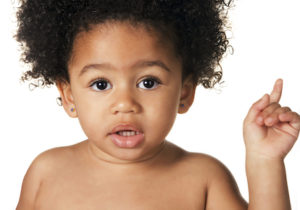Doctors’ Notes
BackSpeech Development & Delay
I often get questions like these from parents: Is my child saying enough? The baby down the street won’t stop talking, and my baby is the same age and only knows a few words — is my baby OK?
In this Note, I’ve assembled a list of normal communication developmental milestones. If your child isn’t meeting these milestones, let us know.
Before 12 Months
 Babies start communicating nonverbally long before their first word. In these months, your baby should be cooing and babbling. By 9 months, they should be stringing sounds together like “mama” or “dada.” They should start recognizing names of common objects like “bottle.” By one year, they should be able to wave “bye-bye” and babble with intonation.
Babies start communicating nonverbally long before their first word. In these months, your baby should be cooing and babbling. By 9 months, they should be stringing sounds together like “mama” or “dada.” They should start recognizing names of common objects like “bottle.” By one year, they should be able to wave “bye-bye” and babble with intonation.
12-15 Months
Children should have a wide range of babbling and beginning to imitate sounds and words. They should know 1-3 words. Your child should be able to follow one-step commands like “Please give me that toy” and point for something he wants.
18-24 Months
There is a lot of variability, but by 18 months your child should say 15-20 words. By age 2, about 50 words. At 2 years, your child should start saying two-word combinations like “up now” or “Hi daddy.” They should also be able to follow two-step commands and identify 2 body parts when asked. They should also be pointing to things they want you to look at.
2-3 Years
You should see a huge explosion in speech. Your child should have too many words to count and be making three-(or more)-word sentences. Other people should be able to understand about half what they say by age two, and 75% of what they say by age three.
Red Flags
If your child shows some speech delay and/or shows any of the following behaviors, listed let us know:
1. Doesn’t cuddle like other babies
2. Doesn’t return a happy smile
3. Doesn’t seem to notice if you are in the room
4. Doesn’t seem to notice certain noises
5. Acts as if he or she is in own world
6. Prefers to play alone, not with others
7. Has intense interest in objects young children are not usually interested in
8. Doesn’t point for things he/she wants by 18 months
Delays in Language
Speech delay is the most common type of developmental delay, affecting 1 in 5 children. Some children will show behavior problems if they can’t express themselves because they are frustrated. Some late talkers just need a little more time, and parents can work with them at home. However, some children need speech therapy to help the delay along. Sometimes a speech delay can be a warning sign of a more serious problem, including hearing loss or even an autism spectrum disorder.
What Your Provider May Do
If your child is not meeting these developmental milestones and/or has the red flags, bring it up with us. We will likely ask you some additional developmental questions. If we suspect a delay, we may get a hearing test. We may also refer you to a speech and language therapist for evaluation, or to an early intervention program.
What You Can Do
In general, spend a lot of time talking to your child, so she can hear speech. Read to him. Talk your day out loud. Have family members help. Encourage your child to “talk” back to you through gestures and sounds.
MODELING
Hold objects close to your mouthm and when you have their attention, model the word you would like them to say
DESCRIPTIVE PLAY
Describe what your child is doing, so they can hear more words
CHOICES
Hold out items and ask your child to choose, such as, “Do you want an apple or banana?” Repeat the words and keep them simple.
MOVING
Combine movement with repetition. For example, when going up or down stairs, say ”up, up, up” with each step
REPETITION
When your child wants a specific item, such as a drink, model the word for your child and pause to give him/her a chance to process and repeat back.
Remember: Talk, talk, talk. Encourage. And motivate. The more your child hears speech and attempts to produce speech, the more likely your child will speak sooner. And don’t forget to touch base with us if your child isn’t progressing as expected.
Dr. Ditte Karlovits joined Kids Plus in 2012.